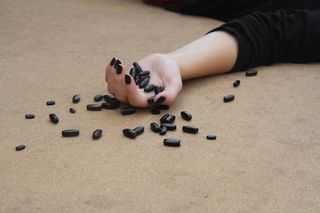
Depression
Joining the Military to Beat Depression
Denise Ranaghan tells the story of her suicidal depression and recovery.
Posted February 14, 2018

Written by Denise Ranaghan
On the psychiatric ward I didn’t get out of bed for weeks except to pee. The bathroom had two entrances, one from my room and one from the room of the two male veterans on the other side. It stunk of stale urine. I didn’t eat the meals served. I didn’t attend the community meetings. I didn’t respond when the psychiatrist came in and threatened to give me electric shock treatments if I didn’t get out of bed. I didn’t give a hoot about the female veteran who shared the room with me and was in bed almost as much as I was. I did notice that at least she ate. I didn’t talk to Alberta, the nurse’s aide who stood by my bedside every morning and told me I would have to get up some time. Alberta was right about that.
The afternoon came when I did raise my frail and weakened body from the hospital bed and trudge down the hall. The floors under my hospital issued foam slippers seemed very hard and cold, the lights in the hallway seemed very bright and the walls along the corridors seemed very white. Sounds of voices in the distance penetrated my eardrums as if they were coming from a loudspeaker above my head. I reached the TV room and with my slow and delayed steps shuffled over the threshold. Some guys with cigarettes hanging off their lips were playing pool and the first few times the pool stick hit the cue ball my body jolted. Nurses’ aides were huddled in a corner chattering about their personal lives: “You can’t let that boy get away with that sista he ain’t never gonna learn his lesson he need a daddy to whip him into shape and if he ain’t got no daddy he ain’t gonna know how to be no daddy.…” An unshaven veteran sat hunched over on a plastic folding chair, covering his ears with the palms of his hands and tapping his fingertips on the sides of his head. Every once in a while, he would stand up straight, shake his fists in the air over his head, and proudly exclaim, “Oh yes I did. You bet your ass I did!” then sit back down, cover his ears and start tapping again.
That visit to the psychiatric ward was the result my third suicide attempt in the one year, which had landed me in the ICU with grand mal seizures, a tube in my mouth and a catheter in my urethra. It was the year after I was discharged from the military for having a “deeply ingrained maladaptive pattern of behavior of long duration which interfered with the soldier’s ability to perform her duties.” Declaring myself a conscientious objector and refusing to carry my M16 during a surprise war drill contributed to that assessment, but it wasn’t a stand-alone incident.
It wasn’t that I felt more suicidal that year than others. The feeling of being a failure in the eyes of my family and friends, and a burden, had been part of my daily thoughts since I graduated from college. I’d returned to the Bronx projects with others expecting me to get a job, an apartment, a husband, and to begin my journey toward a professional career, and eventually, motherhood. I woke up every morning in an empty four-bedroom apartment, the others off to school and jobs. I either slept or painted in my childhood bedroom, the outside world becoming more and more threatening. Terrified of the alienation and isolation I was experiencing, I impulsively signed up for the military and requested to go overseas because that was very far away from the Bronx. From the institution of academia, I descended into the institution of war, and then for fifteen years the institution of psychiatry, so endlessly alone and hopeless no one could help me. The world was a very unsafe place I was mandated to at birth and would be stuck breathing in until death.
Shortly after the last suicide attempt, my name came up on a wait list for a long-term inpatient program at the New York State Psychiatric Institute. And strangely, I felt safer there than any other place. I lived there for two and a half years and it provided the foundation to build a life. My life was still torture, still grossly disappointing, and still unbearably frustrating. I struggled day in and day out with those “deeply ingrained patterns” and false beliefs that people were malicious and selfish and just waiting for me to fail. There is nothing worse than to become aware that you are creating your own miserable reality when you can’t stop doing it. Realizing that my behavior did indeed affect other people was a needed awakening, but it also confirmed that I had good reason for hating myself. When I felt guilty for my rage and for blaming others, even those who wanted to help me, I had people to tell me I was getting better, not worse. Having a conscience is a sign of health. Over my years in a community milieu at NYPI, receiving psychoanalytic therapy, I realized I had been programmed in a way that worked in childhood, but was not working in adulthood. I had no choice in how I reacted. It was when I became conscious of my unconscious conditioning that the painful journey of recovery began. It had taken years to develop those patterns. And it would take more years to get to a place where I could choose a response. Choice is freedom.
Every good experience I have ever had and every bad experience I have ever had has taught me. When I transform the belief that “nothing can help me and no one can help me” to the belief that “everything can help me and everyone can help me” my predisposition to all or nothing thinking serves me well.
While I was in NYPI, I studied counseling at Columbia University Teachers College. Sitting in a classroom with “normal” students while I was on a pass from the psychiatric hospital, I felt like a spy. I had internalized the stigma of mental illness and did not feel strong enough to reveal my status as a psychiatric inpatient. But in 1992, cultural beliefs about people with mental illness were changing. Psychiatric patients were no longer kept hidden away. I was a patient, but I was also a student and as dichotomous as those two identities seemed, I embodied them. I felt I belonged on the unit more than in the classroom, but I did get my graduate degree. I’m 52 years old. I’d estimate my life started to feel more tolerable about 17 years ago, when I experienced success at holding a job after being fired 13 times since my discharge from NYPI. My terminations resulted from problems with authority, inability to compromise, and always thinking I was right. Somewhere along the line I decided I’d rather be employed than right. And I developed the ability to modify my behavior.
Over the last 17 years I have held multiple positions in the mental health system. In 2011, I went back to school to qualify for licensure as a mental health counselor and was was hired as the director of wellness services at the agency where I was working. With two other people I started a peer led support group for persons who are or were suicidal which we continue to run weekly. Last year, I was hired as team leader for the Assertive Community Treatment team, where I had worked for years as peer specialist.

In addition to embracing the identity of employee and leader in the mental health system, I have also embraced identities as sister, daughter, aunt, friend, animal lover, homeowner, and loving human being. I have not felt suicidal for many many years. I still struggle with intense emotions. I am wired that way. Chemistry and genes do matter. But I have created, thanks to many loving people who helped me along the way, a nurturing environment that makes it possible for me to tolerate intense emotions and channel them constructively. Some things that help me are breathing and meditation, when I remember to do it, practicing mindfulness, a community of spiritual friends, a loving partner, a house filled with fluffy, loving four legged canines, and a career. I love my life today. I feel comfortable in my own skin. The mystery of tomorrow, or even the rest of today, I look forward to with joyful anticipation instead of dreadful projections of failure and defeat. I am so grateful to be alive to experience it.

